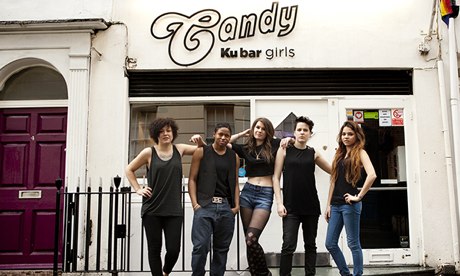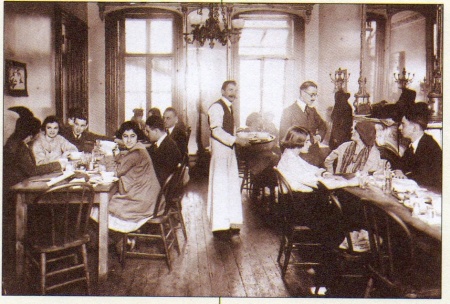 |
| Candy Bar |
Candy Bar
Location: 4 Carlyle Street, London, England, United Kingdom
Opened: 1996
Closed: 2014
Lesbians mourn as Soho's Candy Bar announces it will close
London's most famous lesbian bar is to shut next year, and the security and cosiness it offers gay women will be missed
"I cried a little bit," says Neus, originally from Barcelona, now behind the bar at Candy. Like a lot of London queer girls, she is sad to hear that, at the beginning of next year, the capital's most famous lesbian bar will shut its doors for ever. Since 1996, Candy Bar's buoyant, bubblegum-pink sign has lit up Soho. In 2011, the venue's regulars were the subject of a predictably voyeuristic, yet nonetheless affable, Channel 5 documentary series, Candy Bar Girls. The venue still attracts lesbian pilgrims from all over the world and was recently DJ-ed by the likes of Haim and Chvrches.
This month, owner Gary Henshaw announced that a 50% increase in rent meant Candy could no longer afford to exist. "We tried to pass it on into lesbian hands," says assistant manager Bex Smith, "but none of the lesbian investors could afford it."
Bex moved to London from Penrith, Cumbria, and Candy was her first real taste of the gay girl scene. "I came here in my first year of university," she says. "I drank at Candy permanently for a month, then got a job here."
Early on a Thursday evening, Candy is dotted with girls. I speak to some of them about the closure. Two regulars, Raven and Emma, have taken the news particularly badly. "It sucks," says Emma. "This is our spot." Another couple, Di and Enna, had their first date at Candy.
Bex and other staff are determined to keep the bar's "by girls, for girls" ethos alive. Then again, when British gays are freer than ever to be out and proud, how important are women-only venues? Very, says Bex: "What I've always prided Candy on is that it gives women somewhere to be comfortable." True - men have dominated the gay scene since Plato's day. Candy, in its creditable 17-year stand, has continually sought to challenge that. "You can't necessarily go into any straight pub and kiss your girlfriend, because you know you're going to get stares," says Bex. "Women can come here and be who they want to be."
"Lesbians are more relaxed about where they go out," says Sandra Davenport. She DJed and promoted Candy for two years, before leaving earlier this year. According to her, while weekend girls' nights thrive, lesbians aren't so bothered about where they go for a casual drink during the week. Ironically then, it is the gradual acceptance of queer women into the mainstream that has made the lesbian bar an unsustainable business model. Lesbian bars are a remnant of a sapphic subculture perhaps more relevant to Weimar Berlin than modern-day London.
Having said that, like Bex, Sandra is sure that the security and cosiness that Candy Bar offers gay women will be missed. Neus spent her first London New Year's Eve in Candy Bar, with her mum. And that's one of Candy's most wonderfully bizarre characteristics – it's a rare breed of mum-friendly gay bar. But it wasn't always so sweet. When Sandra started as the bar's promoter in 2011, she was overwhelmed by what she had taken on. "I remember looking at the bar staff – they were leaning over and snogging customers, and messing about behind the bar. I thought: 'Oh my God, I've taken over Coyote Ugly.' I was panicking, thinking: 'What have I done?' The walls were the most hideous shade of pink I'd ever seen.
"I think people were still scared of that pink for years," says Sandra. But, through Henshaw's new ownership and Sandra's promotion, Candy went from puce and underpopulated to black and bustling. Meanwhile, Channel 5's Candy Bar Girls boosted the bar's popularity. "It got people talking about Candy again, when no one had talked about it in a positive way for so, so long," says Sandra.
London lesbians certainly have a love-hate relationship with Candy. "A certain kind of girl won't come here," says Bex, "They see it as cheesy." But she and Sandra insist that its spirit will live on.
"I cried a little bit," says Neus, originally from Barcelona, now behind the bar at Candy. Like a lot of London queer girls, she is sad to hear that, at the beginning of next year, the capital's most famous lesbian bar will shut its doors for ever. Since 1996, Candy Bar's buoyant, bubblegum-pink sign has lit up Soho. In 2011, the venue's regulars were the subject of a predictably voyeuristic, yet nonetheless affable, Channel 5 documentary series, Candy Bar Girls. The venue still attracts lesbian pilgrims from all over the world and was recently DJ-ed by the likes of Haim and Chvrches.
This month, owner Gary Henshaw announced that a 50% increase in rent meant Candy could no longer afford to exist. "We tried to pass it on into lesbian hands," says assistant manager Bex Smith, "but none of the lesbian investors could afford it."
Bex moved to London from Penrith, Cumbria, and Candy was her first real taste of the gay girl scene. "I came here in my first year of university," she says. "I drank at Candy permanently for a month, then got a job here."
Early on a Thursday evening, Candy is dotted with girls. I speak to some of them about the closure. Two regulars, Raven and Emma, have taken the news particularly badly. "It sucks," says Emma. "This is our spot." Another couple, Di and Enna, had their first date at Candy.
Bex and other staff are determined to keep the bar's "by girls, for girls" ethos alive. Then again, when British gays are freer than ever to be out and proud, how important are women-only venues? Very, says Bex: "What I've always prided Candy on is that it gives women somewhere to be comfortable." True - men have dominated the gay scene since Plato's day. Candy, in its creditable 17-year stand, has continually sought to challenge that. "You can't necessarily go into any straight pub and kiss your girlfriend, because you know you're going to get stares," says Bex. "Women can come here and be who they want to be."
"Lesbians are more relaxed about where they go out," says Sandra Davenport. She DJed and promoted Candy for two years, before leaving earlier this year. According to her, while weekend girls' nights thrive, lesbians aren't so bothered about where they go for a casual drink during the week. Ironically then, it is the gradual acceptance of queer women into the mainstream that has made the lesbian bar an unsustainable business model. Lesbian bars are a remnant of a sapphic subculture perhaps more relevant to Weimar Berlin than modern-day London.
Having said that, like Bex, Sandra is sure that the security and cosiness that Candy Bar offers gay women will be missed. Neus spent her first London New Year's Eve in Candy Bar, with her mum. And that's one of Candy's most wonderfully bizarre characteristics – it's a rare breed of mum-friendly gay bar. But it wasn't always so sweet. When Sandra started as the bar's promoter in 2011, she was overwhelmed by what she had taken on. "I remember looking at the bar staff – they were leaning over and snogging customers, and messing about behind the bar. I thought: 'Oh my God, I've taken over Coyote Ugly.' I was panicking, thinking: 'What have I done?' The walls were the most hideous shade of pink I'd ever seen.
"I think people were still scared of that pink for years," says Sandra. But, through Henshaw's new ownership and Sandra's promotion, Candy went from puce and underpopulated to black and bustling. Meanwhile, Channel 5's Candy Bar Girls boosted the bar's popularity. "It got people talking about Candy again, when no one had talked about it in a positive way for so, so long," says Sandra.
London lesbians certainly have a love-hate relationship with Candy. "A certain kind of girl won't come here," says Bex, "They see it as cheesy." But she and Sandra insist that its spirit will live on.





